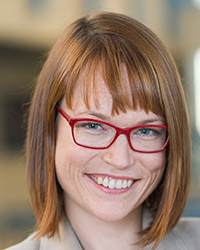2014 Janet Taylor Spence Award

J. Kiley Hamlin
University of British Columbia, Canada
What is the focus of your award-winning research?
My research focuses on the very early development of social and moral cognition in infancy. My dissertation research was the first to discover that preverbal infants prefer “good guys” to “bad guys” — or prefer those individuals who help versus prevent third parties from achieving their unfulfilled goals. These preferences emerge by at least 3 months of age toward characters who help and hinder in a variety of physically and conceptually distinct goal scenarios; control conditions suggest that infants’ preferences do not stem from any low-level physical aspects of helping and hindering events.
Subsequent work has revealed that in at least some cases, infants’ social preferences are in striking alignment with ones that we might consider complex, even in older children and adults. For instance, within the first year after birth, infants evaluate helpers and hinderers based on their mental states rather than on the positive or negative outcomes they cause, and they evaluate characters who perform the very same action differently in different contexts, preferring those who hinder someone who previously harmed another rather than those who help across the board. These findings suggest that evaluating others as good and bad is general, is flexible, and is a fundamental aspect of humans’ earliest observations of the social world.
How did you develop an interest in this area?
My interests lie in the origins of knowledge in general, but particularly in how humans beings come to understand that others are agents whose actions are motivated by underlying and persistent mental states. As an undergraduate research assistant in Amanda Woodward’s infant cognition laboratory at the University of Chicago, I helped develop a selective reaching method to identify whether and when infants understand others’ object-directed actions as reflective of underlying intentions. When I began graduate school, I planned to continue this line of work with my advisor Karen Wynn.
Before I arrived in her lab, Karen’s postdoc Val Kuhlmeier (together with Karen and Paul Bloom) had developed a helping and hindering paradigm, in which a “Climber” repeatedly tried but failed to get up a hill, and would be pushed up the hill by a “Helper” or pushed down the hill by a “Hinderer.” As demonstrated via attention, infants subsequently distinguished events in which the Climber demonstrated a disposition to approach the Helper versus the Hinderer.
When I watched this stimuli, it occurred to me that while part of me cared about what the agent thought about the Helper and Hinderer, I was far more interested in what I thought about the Helper and Hinderer: I liked the Helper and I disliked the Hinderer. As one of the most important reasons humans mentalize (recognize mental states) at all is to be able to identify and avoid those who mean them harm, it struck me that examining infants’ evaluations of valenced intent might be a fruitful way to study infants’ understanding of agents more generally. Thus, we adapted the selective reaching technique to the helping/hindering scenario, and the work took off from there.
Who are your mentors and/or biggest psychological influences?
My advisors in graduate school, Karen Wynn and Paul Bloom, were each hugely influential in my thinking. Indeed, when I entered graduate school I believed very specific things about how infant social cognition (and the origins of knowledge more generally) worked; my theoretical stance was actually rather opposed to that of my new advisors. Rather than requiring me to align my stance to their own, Karen and Paul allowed me to run experiments that interested me, even if in each one we had completely different hypotheses about what infants would do and why. (They were often right; sometimes I was right.)
In the end, I felt compelled to endorse theories my advisors had always held — but I endorsed those theories based on the data we collected together and the studies I designed. I did not feel forced to bend to their stance without evidence. This was quite humbling and an incredible mentoring gift to receive; I hope I can provide it to my own students. In addition, my undergraduate advisor Amanda Woodward was an extremely supportive and attentive mentor who treated me as if my ideas were worthwhile even when I was a sophomore in college, showed me how to turn those ideas into empirical research, and subsequently spent hours crunching stats and editing manuscripts with me. In addition, Amanda was a fantastic model of a deep thinker and a careful scientist who is uniquely interested in discovering how the mind works.
What unique factors have contributed to your early success?
I attribute my early success to outstanding mentors who provided both support when I needed it and freedom when I did not, and to the incredible capacities of the infant mind. Of course, success was and still is a lot of hard work, but I am humbled by the amount of luck that is involved in making new discoveries. Indeed, our initial findings were based largely on a hunch that something interesting might happen and that it was worth a try to find out; we were floored by the robustness of the data that followed. To this day I feel amazed that infants are capable of the complex social evaluations they continue to demonstrate in my lab every day.
What does winning this award mean to you both personally and professionally?
It is a great honor to win this award. It is immensely gratifying to know that the topic I find so interesting and important is recognized by the greater psychological community and that my work is seen to have made a significant impact on the field of psychological science. Personally, this honor makes me feel as if all of the long hours are worth it; professionally I have no doubt it will lead to additional opportunities for future discovery. I am incredibly excited to see what comes next.

